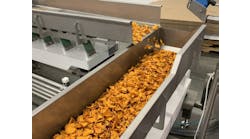Floodwater of the Cedar River surrounds the Quaker Oats plant in Cedar Rapids on June 13. (Liz Martin/The Gazette)
Floodwaters run through the Cargill corn processing plant on the south side of Cedar Rapids, one of two Cargill plants in the city, as the Cedar River continues to rise on June 13. (Liz Martin/The Gazette)
Marine One flies over the Quaker Oats plant in Cedar Rapids, Iowa, as President George W. Bush visits flood zones of Cedar Rapids and Iowa City on June 19. (Liz Martin/The Gazette)
A ruptured grain silo knocked over railcars at the Cargill soybean crushing plant near Cedar Lake on June 15 in northwest Cedar Rapids. Cargill also had a corn processing plant damaged in the floods (see other photo). (Jim Slosiarek/The Gazette)
Among the sites affected is PepsiCos Quaker Oats plant in Cedar Rapids, Iowa. On June 11, PepsiCo closed the flooded facility. (See a slideshow of the affected plants) Quaker engineers and safety personnel were able to tour the facility a few days later as part of an ongoing assessment of the situation. While the company expects disruptions to normal service for several weeks, including product allocation to the retail trade of some Quaker foods and snack items, PepsiCo expects to return to full production at the plant. In the meantime, the company has redirected some production to other Quaker facilities. In its statement, the company indicated that it had ample insurance to cover both the facility and the business interruption. Further, it does not expect the outage to adversely affect the companys financial performance for the year.
The closure of another Cedar Rapids plant, Cargill Inc.s corn milling facility, forced the company to declare force majeure on corn syrup contracts. This means that Cargill will not be able to meet all of its customers contract volumes, and supply of corn syrup from Cargill will be limited until the situation is resolved. The company plans to allocate available corn syrup among its customers in a fair and equitable manner, according to a company statement. In addition, Cargills operations at two grain and oilseed plants in Cedar Rapids also were shut down.
In the wake of the Cargill closures, Reuters reported that shares of soft-drink makers fell on the news. However, the plant shutdowns were less troubling to investors than concerns that the cost of corn syrup will rise as flooding sends corn prices to record highs on fears of crop losses.
Aside from the high-fructose corn syrup used in its drinks, PepsiCo uses corn to make Frito-Lay snacks. PepsiCo said it was largely covered on key commodities for 2008. A PepsiCo spokeswoman declined to specify the company's exact exposure to corn, beyond saying that it was one of PepsiCos top 10 input costs and that no one input was greater than 10 percent of the companys total cost of goods sold, according to the Reuters report.
Cargill and PepsiCo were not the only food-related companies forced to shut down Cedar Rapids plants. Penford Corp. had to temporarily close due to the flooding of the Cedar River, which caused a mandatory evacuation of the plant and surrounding area. The plant produces starch and ethanol products and accounts for approximately 55 percent of the companys revenues. According to a company statement, it is still too early to estimate total damage costs or when the Penford plant will become fully operational. However, the company anticipates the facility will not be able to manufacture significant product volumes before the end of August.
While not completely shut down, the Red Star Yeast plant in Cedar Rapids is operating under restrictions put in place by city utility management. The company said it was aware of the approach of the July 4th holiday, which brings an annual increase in yeast requirements. The company remains confident that all orders will be filled, as the plant was not inundated by flood waters. However, Red Star cannot accurately predict when full operation will resume.
The cost of the disaster may end up rivaling that of the 1993 Midwest floods, which caused more than $20 billion in damages. Losses from recent flooding have yet to be fully assessed.


